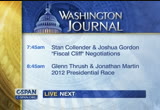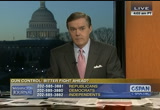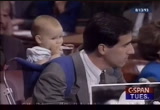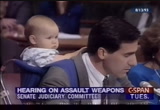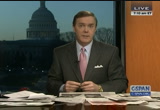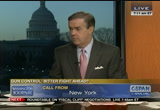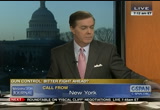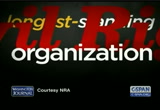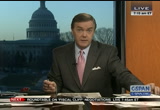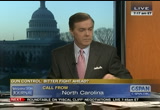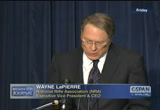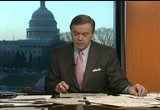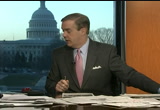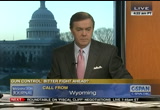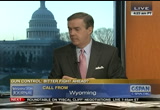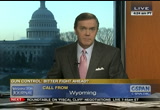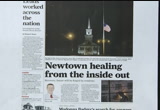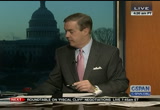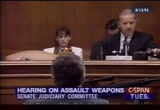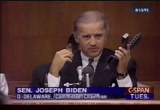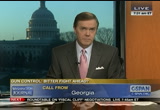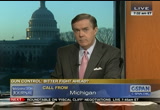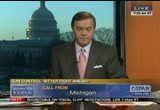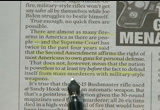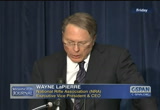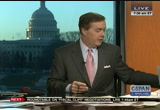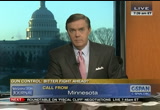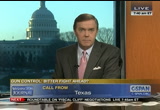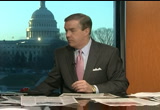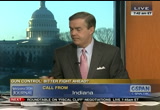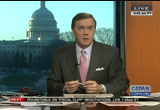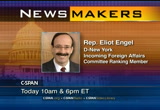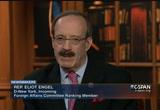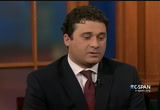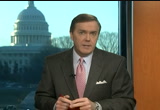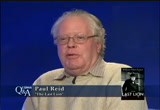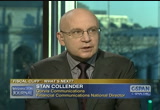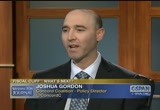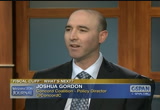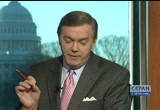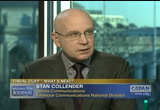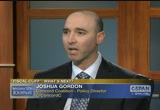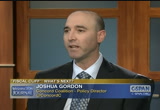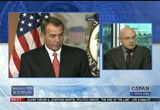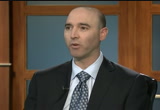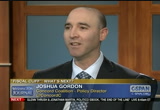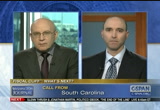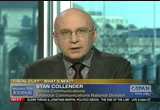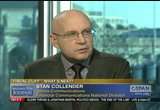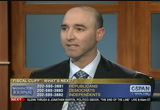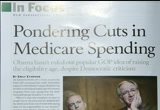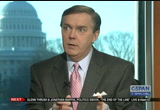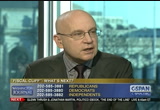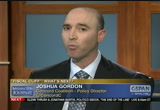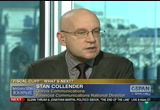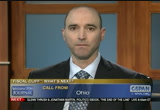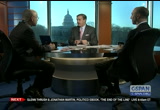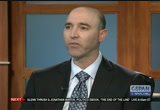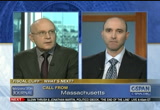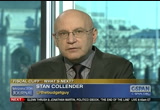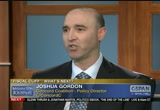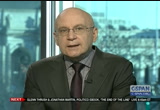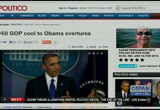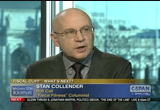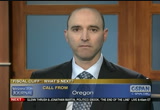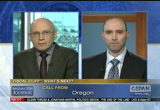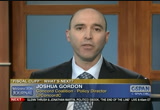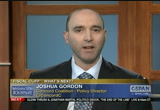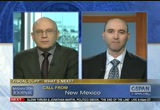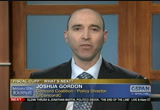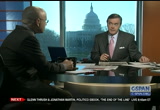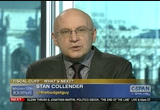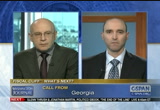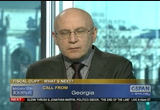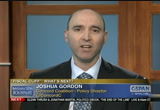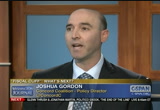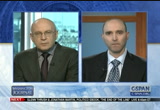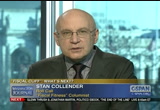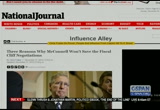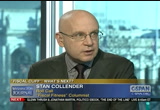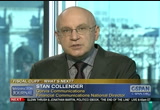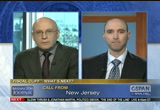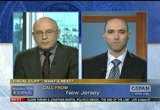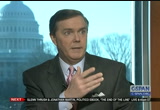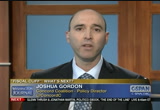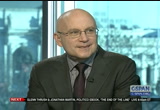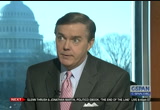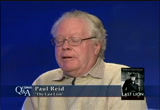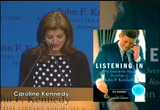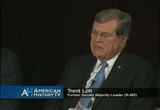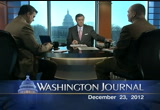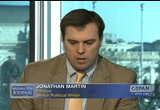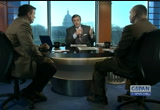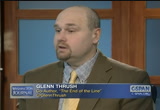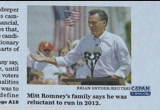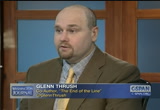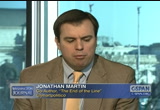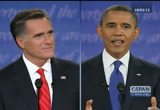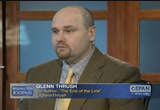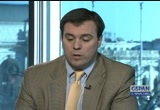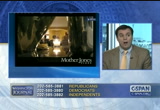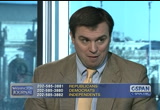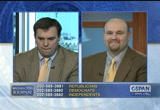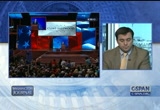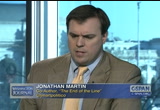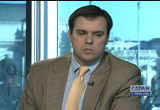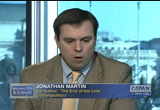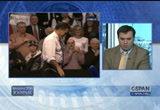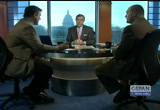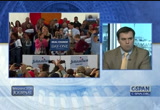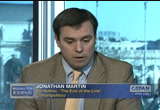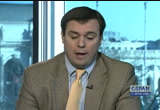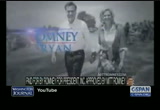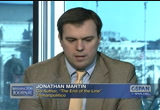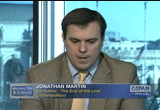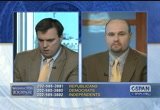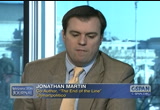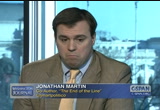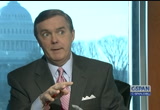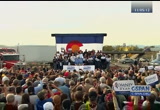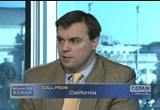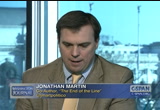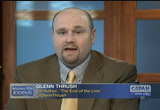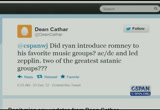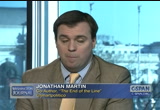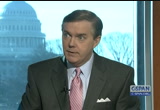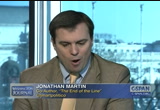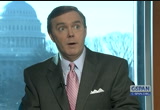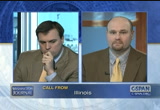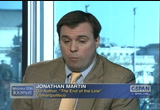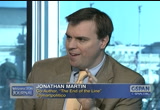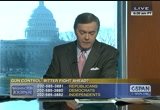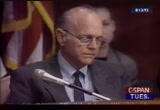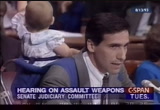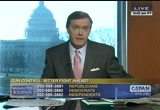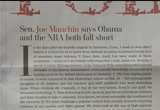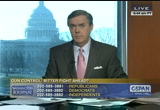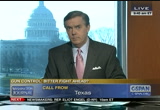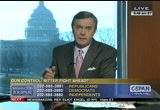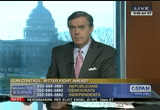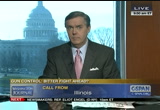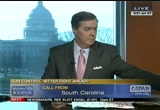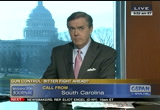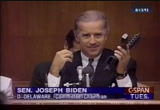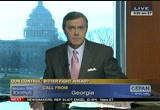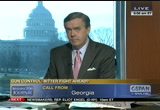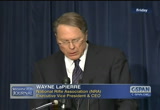tv Washington Journal CSPAN December 23, 2012 7:00am-10:00am EST
7:00 am
the 2012 presidential campaign. we will be live with your calls, tweets, and e-mails, "washington journal" is next. ♪ host: good morning , president obama is in hawaii this weekend for the christmas holiday with his family. he will join a congressional delegation later today led by harry reid in services in holland -- in honolulu for late senator daniel inouye passed away last week that congress will return monday to continue fiscal negotiations. we will look at the options ahead for the president as the january deadline looms but we want to begin with your comments on another debate front and
7:01 am
center in washington following the tragic shooting in newtown, conn. -- that is gun-control. "the washington post" said a bitter fight ahead. the numbers are on your screen. we look at some of the headlines on the sunday morning beginning with "the connecticut post." - you can see the flag remaining at half staff outside one of the churches in newtown, conn. following the burial of 20 children and six women killed about a week and a half ago. this is from the front page of today's "new york daily news."
7:02 am
7:03 am
that was nearly 20 years ago in 1993. we will hear from that testimony in a couple of minutes. we want to get your calls and what is ahead in gun-control. roy is joining us from north carolina, the independent line, good morning. caller: it could be a bitter fight but i think some drastic action needs to be taken. it should be at least as burdensome for the gun owner as it is for a car owner. registration, insurance, testing, everything -- handguns are a big problem, too. i think it is so bad that the president should do some kind of executive order and put a
7:04 am
moratorium on military rifles, at least, because around here in western north carolina, there are gun shops and people waiting for four hours to get to this ar-15. they say they will not take it out of the box, the majority of them. they will either have it as an investment or have it grandfathered in. this is like undetectable poison. 300 million guns that have proliferated the whole country. we have plenty of guns and a source needs to be stopped and drastic measures need to be taken. i hope it is not bitter. host: thanks for the call. from facebook --
7:05 am
from twitter -- dale is joining us on the democrats' line from albuquerque -- caller: good morning, i hope america thinks about the nuclear arms race. someone said the only way to stop a bad person is to have a good person with an assault weapon. no matter how or work, we're all going to lose. we need to disarm.
7:06 am
the people who should have a military assault-type weapons is the military. host: we will go to the republican line from new york city. caller:hi, i am a physician and worked in the time of son of sam and i treated one of his last victims. the destruction that a sudden killing like this is enormous. i think the mental health screening has to be more pori part of this. the fact that we cannot commit people showing extreme mental illness with several rights laws is a deeper issue than gun control. >host: how should vice president joe biden and the white house address this.
7:07 am
mental illness is part of the debate and will be part of the solution. >> i think they really need to look at civil rights laws and be able to intervene more aggressively with mental health professionals when people show a consistent pattern of mental illness. i think you can travel through any city in america and see massive amounts of people who are not capable of taking care of themselves. as a society, we are not humanitarian when we leave them to defend themselves. >host: this argument is not new. it is highlighted in the extensive report in "the washington post." the chair of the senate judiciary committee, joe biden, we will hear from him.
7:08 am
the witness testifies and next to him is sarah brady whose husband was shot during the reagan assassination attempt back in 1981, jim brady. still law was named after him. let's take you back to that hearing -- [video clip] >> life is completely shattered. my daughter's life is completely shattered. i don't know how many of you have taken a trip to the coroner's office to look at the most important person in your life with five bullets in their body. let me tell you, when they lie there lifeless, is pretty painful. no one, no one needs to experience this kind of paying.
7:09 am
p ain. my wife's last words were," i am having trouble breathing," and that she died in the floor of a conference room alone. the sight of her 10-month-old daughter of placing dirt on her grave is a sight that i prayed no other person has to experience in their life. can any of you advise me how to tell a 10-month old hat that mommy is dead? perhaps the manufacture of the injured tech dc-9 all weapon should publish this in their manual. the most important reason i am here today is because i feel sorry for the hundreds of thousands of people that will feel my pain. these people that our next do not know who they are and they don't know when it will happen and that is why my heart goes
7:10 am
out to you. that is why the president of the united states told me that he supports not only the brady bill but a ban on semiautomatic assault weapons. these things to see in front of us -- assault weapons of the kind used to brutally murdered my wife and seven others and injured many more threatened the well-being of our most important natural resource, our people. all laws that permit the sale and use of semi-automatic assault weapons in the united states must change. >> that is from august 3, 1993, the debate over the assault weapon ban and the testimony of one of the victims in the u.s. "the new york times"had this sense bowl and poignant photograph --
7:11 am
from our twitter page -- al joins us on the phone from new york. caller: good morning. with freedom comes great responsibility. owning a gun is a demonstration of freedom but also requires that you demonstrate responsibility for owning that weapon. i am a gun owner and i was a soldier at one time and i know what bullet can do to flesh and bone. as possibly an option, i think perhaps, like you drive a car, you have to have insurance to drive that car to protect
7:12 am
yourself and others. perhaps we should have gun owners by a particular policy that protected from any accidents that happen. also, i think perhaps to get a gun, you need to have some kind of psychological profiling. the military does it and i was in, they call the day 201 file and to purchase the weapon, not just a background check, but have documentation that you have been counseled and you are fit to own a weapon. as far as the high-capacity magazines, no need for it. if you are hunting for an animal, if you cannot have it with three shots, there is no need to have a 30-shot clip. that is purely for military use. host: this is from liz smith --
7:13 am
what does the second amendment to the u.s. constitution state? a well regulated militia being necessary for a free state and the right of the people to keep and bear arms shall not be infringed. the nra has a new web ad, taking aim at the u.s. constitution and critics of gun legislation. [video clip] >> never fight if you can afford not to but if you must fight, do not lose and nothing less than freedom is at stake, fight. we are millions of people just like you with the longest standing civil rights organization in the u.s.. we are proud defenders of history and protectors of the second amendment, advocating the right to keep and bear arms,
7:14 am
7:15 am
advocate. we're taking your calls and comments -- will it be a bitter fight ahead? we go to the democrats' line from macon, georgia. caller: how many children are we going to lose to guns before something is done? i remember during the 08 election, there were people around the president of the united states with assault rifles. we put people in schools with the guns, what happens if there in the restroom and somebody breaks and from the front? how are they going to protect the children? how many children do we have to lose? host: thanks for the call -- let me share with you this photograph from "the new york daily news."
7:16 am
a handful of students tried to flee and lanza shot teem. some of the other fallen students are in the photograph. because of the teacher process protection, most of her students survived a car. -- survived a the horror. asheville, north carolina, republican line. caller: i would like to say one thing and i think there is a
7:17 am
connection that people are overlooking -- i think people especially recently and as far back as timothy mcveigh and the people who crashed into the tent -- twin towers, they are terrorists. terrorist attacks society by creating fear, mayhem, and everything else. is the united states overlooking this? are we creating terrorists? beene young people have t attacking people with assault rifles, they all have the same sort of expression on their face. terrorists are always indoctrinated people. they use these people to create fear in a society to promote fear as terrorists and the people are indoctrinated. i don't think people are
7:18 am
recognizing that and they can use guns are bombs are car bombs or words or anything but they are indoctrinated people and i would like people to recognize that. especially right now because i would like the fbi to really investigate who these people talk to and who are they approached by and how the day end up looking insane? host: thanks for the call and the comment from "the new york post." - above that is the quote from swine lapierre - "the only thing that stops a bad guy with a gun is a good guy with a gun." this is from twitter --
7:19 am
we are asking you about the debate ahead over gun control. wayne lapierre spoke to reporters friday which was billed as a news conference but he took no questions. he took aim at the media -- [video clip] >> how many more copycats are waiting in the wings for their moment of fame? from a national media machine that rewards them with wall-to- wall attention and a sense of identity that they crave while provoking others to try to make their mark. a dozen more killers? 100 more? how can we possibly even guess how many given our nation's
7:20 am
refusal to create an active national database of the mentally ill. the fact is this -- that would not begin to address the much larger and more lethal criminal class -- killers, robbers, rapists, gang members, who have spread like cancer in every community across our nation. host: comments of wayne lapierre friday. that speech is available on our website, c-span.org. we go back to senator joe manchin --
7:21 am
he is calling for a larger conversation on gun issues and mental health and the entertainment industry. there is a related headline from "the washington post." chicago is grappling with its own gun violence. gloria is on the phone from sheridan, wyoming, independent line, good morning. caller: good morning, i don't believe in assault weapons.
7:22 am
i do have several other points and hopefully i will not get cut off, i will make them >>. we mentioned a second an amendment but we don't mention what is behind that and what are far the -- our founding fathers did not want was basically a government where the citizens were unarmed and the government was so powerful it could kill people. it is not just for hunting. it is for personal protection from foreigners that might come in. it could be terrorists or our own government turning on us. we always think we are protected because we have the freedom but just like reagan and some of them have said, we are always one step away from losing those freedoms.
7:23 am
that is one thing to be said. the other thing is that i believe the entertainment industry is a lot to blame in many ways. we have the violent video games, first person shooters, that desensitize the kids and adults. . host: that goes to the freedom of speech of the american constitution. how do you think congress should deal with the entertainment industry, video games, and the arguments that we will hear from supporters of the entertainment industry saying this might infringe on the first amendment? caller: there is a first amendment right but there is personal responsibility and a moral responsibility. all we are putting out there is sex and violence. the sex is a blatant along with
7:24 am
violence. how many people out there when they stopped to think of it can actually name a family friend late movie -- a family friend late movie - friendly movie? you see them on reruns and stuff like that. a family comedy without filthy words and sex and somebody killing somebody else -- there is no good reason -- if you look at the old westerns like john wayne or something, they had violence but the violence was not the be all and end all. they were protecting somebody.
7:25 am
they were protecting the ladies or a wrench. -- or a ranch. there was a purpose rather judge -- rather than just going up and shooting somebody. host: let me move on, thank you very much. caller: let me make my other point -- we've got to stop and consider that a gun does not pick itself up, a human picks up a gun. host: this is the headline from "the connecticut post" - from reston, va., democrats line -- caller: i have a suggestion. i think england is our grandmother and i know they don't use guns and law enforcement. that helps a little bit.
7:26 am
we have to find out how they do it. the united states is based on monday and the business. politicians -- the united states is based on money and business. politicians and all that is based on making money. host: this is from twitter -- our calls this morning is focusing on the bitter fight ahead on the issue of gun control. we go to erie, michigan, republican line. caller: good morning. i have a couple of grandson's about the age of the children
7:27 am
that were killed. i think the politicians are wasting their time. anybody can fabricate a high- capacity magazine. all they would have to do is take the model of the war on drugs. that would cure all our problems. host: me get back to "the new york daily news" -- their tiny caskets not only told of innocence lost the compound of the pain of the
7:28 am
month of a crime that has shaken the foundations of a country. one of the priest said it is a horrible tragedy and makes no sense to us. they are saying if you have not been angry, get angry. that these 20 children cannot change these -- this world, no one will. that is this morning from "the new york post." -- "a new york daily news." let's go back to the testimony of 1993. we heard from one of the husband of the victims and senator joe biden was chairing that committee. here is what senator biden said 19 years ago. [video clip] >> one of the thing that was talked about is one senator would like very much for us to get the facts out and have a debate based on the facts.
7:29 am
i, for one, do think there are legitimate second amendment arguments relating to how government can curtail access to weapons. i have spent a lot of time to study that issue. i even teach that issue in law school. i happen to believe the second amendment was designed to protect the right of people to hold and bear arms. i am not one who takes that lightly. but we cannot debate the fact in the national forum. one of the facts i have never heard and i would invite those who will testify today in opposition to the ban is what is the economic impact to the manufacturers and the gun dealers on the sale of these kinds of weapons if we were to curtail the ability to manufacture and sell?
7:30 am
what would be the impact? i would like to know the facts. those figures have to be available. they are useful things to know. host: the senate took up the ban on assault weapons. from "the washington post" -- he is the author of "the rumor is wore a coat he is a member of the nra. he also says -- ." the rumor is war he is a member of the nra. he also says -- the next call is from steed from georgia, on the independent mind.
7:31 am
guest: -- caller: has a nice name you have. how're you doing, steve? there are things happening in this country, and they are not being addressed. people are calling for blood in the streets. every time they get together, hate crimes against black people. the black caucus not standing up to them. al sharpton is not standing up to them. the trouble in plaque -- in packs like rabid dogs. what ever they are, they defecate on police cars and all of that. we do not have that in the south. we also have multiple weapons. if you do away with them, the progressives will turn them loose in the streets.
7:32 am
>> thank you for the call from georgia. juanita from michigan. caller: i am so glad that the conversation is opening up to a broader area than just guns. this is not the first time this tragedy has happened. the entertainment and mental health, those areas, they are being explored. one that i think is kind of weary -- kind of a directly related to it, that explains this act -- this epidemic, that we are seeing in terms of violence, it is possibly related to the drugs that we take. the commercials on television in -- it is so disconcerting, the side effects. almost all the time, the madison -- flue medicine,
7:33 am
bizarre behavior, dreams. all of these things alter our mental and psychological -- had a friend who is taking an antidepressant medicine years ago, and she got so frightened because of how it made her just not care about anything. it scared her so much that she really stopped. could she have hurt her children? i think she felt that she could have. these drugs -- to take on the drug industry, we are creating zombies. i think it was interesting the girl that said, the look that these people have. we really are doing ourselves some very bad things with the side effects of these drugs. i think it might have a great effect. i wish we could do autopsies on these people who have done a terrific things to see what is in their systems. i think we should include some
7:34 am
of these, what might seem like the nine things -- they might be altering our mental capabilities. >> the mother much. -- host: here are the major shooting -- major shooters, involved in mass killings within the last year. tucson, arizona, the shooting of debbie giffords. the killings in or, colorado. most recently, adam lanza from connecticut. the new york post has an editorial want to show you --
7:35 am
then there was this from the editorial saying -- we will hear some more from the statement he made on friday here in washington at the willard hotel. >> the nra is compiling all its knowledge, dedication, and resources to develop a model of the national school of emergency response programs. that is for every single school in america that wants it. from armed security to building design and access control, to information technology, to student and teacher training, this multifaceted program will be developed by the very best experts in the field.
7:36 am
a former congressman will lead the effort. with a budget provided by the nra, of whatever scope the task requires -- >> that is from the ceo of the nra. the front-page headline -- philadelphia inquirer" -- back to your calls and comments on the issue of gun control. what is ahead? kathleen from chicago. caller: good morning. okay, give me a couple of seconds. first of all, i hear everybody calling in, talking about mental illness. how do you define mental
7:37 am
illness? i cannot say this guy's name that did all of this killing last friday. i do not even want to say his name. killing all these innocent babies. who was mentally ill? him, doing this killing, or his mother who knew that she had a mentally ill child and purchased all these weapons, brought them back into the house around him, took him to the firing range, taught him how to shoot these guns -- one was mentally ill? this other guy, the nra -- when you mentioned people's names, you give them life -- the sky, while these people were putting their precious babies in the ground, this is why i am so upset with the media. after five minutes, this guy should have been cut off. he had nothing in the pot. these people were burying their children. he was sitting up here promoting more guns, more guns. i do not understand the media. we're supposed to be the smartest, the best of the best
7:38 am
in this world, the u.s. we do some dumb stuff. that was so insensitive to let that man rebel on and on a while people were burying their children. i'm looking at people this morning giving credibility to the -- to what this man is saying. these people are grieving over their babies. become a more civil. if you are having a gun -- if that is what people want -- why do they need assault rifles? to hunt down other people? people do not realize what is happening until they are being shot. host: kathleen, thank you for the call. a look at this morning, the front page of "the new york daily news" -- mark is on the phone from minnesota, the republican line. caller: good morning, steve. a lot of interesting viewpoint
7:39 am
coming through this morning. in the past, c-span has been very fair and balanced, and i noticed this morning, you're swinging a little bit to the left. host: i do not think so. but go ahead. caller: you are showing glimpses of hearings held in the past. they have all been here for gun control. host: we also heard from the nra and a new web video they're released. caller: the hearings. i remember hearing these hearings were you had people -- one woman accused -- used an ar- 15 to defend herself. getting back to what i called about -- these so-called assault weapons, assault weapons has been made up by the media. remember, these are all single
7:40 am
shot weapons. they cannot shoot any faster, and the rounds they fire are actually less lethal than sports and news for deer hunting. i could go on and on, but thank you for giving me this time. keep up the good work. host: from "the "new york post" -- emilie, joe is it -- josephine, and anna were buried yesterday. bob is joining us from houston, texas, the democrats' line. caller: i would like to say that the assault rifle should be treated like the automobile -- you have to have a title to them and buy insurance and the
7:41 am
higher the gun power is, the higher insurance, and when you sell it or do something with it, the title should be transferred and responsibility transferred to the person that owns it. in this way, we would have to go big organizations working, trying to come up with the right solution, the nra and the insurance industry. if you want to own something, you should be responsible for it. host: double for the call. from the new york times book section -- we are featuring the -- "the last line -- lion" interview this evening. gayle joins us from louisiana. democrats line. caller: independent line. host: it's as democrats, but go
7:42 am
ahead. -- it says democrats, but go ahead. caller: on this assault weapons controversy, a couple of things -- what happened to those children was awful. what happened to those people from superstorm sandy was awful. when we bomb and destroy andple's homes and children', it is not a declared war. those people suffered just as much as these people do. the other thing -- we have senators, like mitch mcconnell, and he, his wife, and his in-
7:43 am
laws benefit from his position because they are part of a chinese shipping magnate. his wife was secretary of trade under the bush administration. they are using their position to help china, and china is the biggest abortion country in the world. when you throw all this into a big mixture, you cannot blame the gun. host: thank you for the call and comment. a bitter fight had on gun control, according to the washington post.
7:44 am
we are following some of the options on what is next. speaker boehner is confronting a political cliff over the budget track is, putting out that the speaker's leadership and legacy remained at stake. they point out that in a show of support, house leader eric cantor. at a news conference with the speaker in a call to extend the tax rates. some have urged congressman tom price of georgia to challenge john deere for the job. much more on what is next for the fiscal cliff. one week before we reach that point. the deadline is december 31, january 1. the president is in hawaii. the house and senate are also in set -- in session this week. elliot engel, weighing in on a number of topics, including rumors that former republican senator chuck a bill could be nominated as defense secretary.
7:45 am
you heard from the president on friday as he nominated senator john kerry as secretary of state and the new speculation about chuckle over at the pentagon. here are the comments of congressman dingell, the incoming democratic member of the house foreign affairs committee. but there is a huge opposition to the potential nomination of chuckled to become the next secretary of defense, even the president obama has not made his decision. the former senator has come under fire for statements he has made, including one where he referred to the pro-israel lobby as the "jewish lobby." what is your reaction to that remark? >> i think that remark is a troublesome and problematic. it shows that the very best, a lack of sensitivity, and at the very worst, prejudice. i am concerned about the
7:46 am
nomination. chuck if has been in the senate for a number of years. there is not only a lot of controversy with that remark, but with some of his boats -- votes. i have been hearing it from what my constituents, mainly in opposition to his nomination. >> you mentioned his boats. there are two sets of things -- he declined to sign some letters in the senate that were related, issues relating to the middle east. he also voted against sanctions, specifically against iran and libya. he has expressed the view that perhaps containment might be an option for iran. this does not seem to be totally in line with the president's policies are recent votes in the senate which have overwhelmingly supported more pressure on iran. >> those things are altered. it means -- are all true.
7:47 am
>> do you support or oppose his potential nomination? >> i have not come out in support or opposition. i have trouble with it. i think there are a warning bells and read signals that i hope that the president -- >> what gets you to a decision? he is not an unknown quantity. what i do not do the appointing. i would not appoint him, if i was doing the appointing. >> the democrat of new york, as he moves up as the ranking democrat on the house foreign affairs committee. you can watch the entire interview at 10:00 eastern time here on a cease and 10 -- c-span television and sees an rea. over the last couple of weeks, we have been talking about a number of leading experts as to what to expect with the fiscal cliff. now there is some clarity.
7:48 am
war and that is coming up in a few minutes. we'll be joined by stan colander and joshua gordon. we want to take a look at some other programs on c-span.org radio. -- c-span radio. >> good morning. and today's network tv talk shows, the discussion continues on the shooting in newtown, connecticut. also gun control and the nra, negotiations on the so-called up fiscal cliff, and the state department's report on benghazi. all five programs we err on c- span radio beginning at noon eastern. david gregory will come and our rate ceo, chuck schumer of new york, lindsey gramm of south carolina, and utah congressman jason shave it. at 1:00 p.m., guests include former dea administrator, sarah
7:49 am
brady of the gritty center, -- brady center. then host chris wallace sits down with john grasso. he is german of the senate -- chairman of the senate republican committee. cnn's state of the union follows at 3:00 p.m.. candy crowley welcomes south carolina republican representative nick mulvaney, ohio republican congressman steve latourette, and independent senator, joe lieberman of connecticut. at 4:00 p.m., but basin asian tito -- host -- an interview with tim scott, the republican senate delegate. also an appearance by an affleck, founder of the eastern
7:50 am
congo and -- eastern congo initiative. these are brought to you as a public service by the networks and c-span. they begin at noon eastern with "meet the press," "this week," state of the union," and "face the nation." you can listen to them all on a cease and radio -- c-span radio, or you can listen on your smartphone or go online to c- spanradio.org. >> if you worked for him, you'd get a merc -- under carol, sometimes generous, sometimes overbearing, sometimes cruel boss. he did not know how to apologize. men of his age and class, they
7:51 am
are not apologize to young private sector -- private secretary typist. he had a way of turning his table, and his version of an apology would be to say, actually, i am a very kind man, and you're doing a good job today, but the issue was never settled. he always had to get the last word in. one night going through what holt, a german bomb fell nearby. he should not have been out at all. his bodyguard, thompson, pushed him into a doorway. a couple of times and's men were slightly wounded -- thompson's men were slightly wounded. turtle said, thompson, do not do that. thompson said, it is dangerous. turtle said, i'm only doing this because and you love to. >> and extended "q&a to cope with paul -- "q&a" with paul
7:52 am
reid. "the last lion" tonight on c- span. "washington journal" continues. >> hours and the roundtable is back again this week with new clarity on the fiscal cliff -- our roundtable is back again this week with a clarity on the fiscal cliff. thank you for being with us. what happens now? >> good question. i guess congress will get back on wednesday. we will see they can come up with something, some figleaf that will give everybody enough political protection so they can cancel the sequester and spending cuts and tax increases that are scheduled. i am still very skeptical that will happen. my guess is that we are going over the cliff. host: you give it about a 75% chance that we would go over the cliff a couple of weeks ago. guest: of today are close to
7:53 am
90%. the new mentality in washington seems to be, we do not have to do this by december 31. the damage to the economy in the short term will be very small. in fact, they have a couple of weeks, if not three or four weeks in january, before this starts to pinch a bit. it is not as much of a cliff as people were seeing a couple of days ago. host: are we going over? guest: it is a slope, that is important to lay out. you do not have major economic effects on your average person's take-home pay. it would take a couple of weeks for that to start happening. you do have -- you have a brief week or to go window to figure out something. host: you are a veteran of the hill. what was the last time that you
7:54 am
remember that congress was here between christmas and new year's? guest: it has happened a lot, especially on budget related matters. even when i worked on the hill, which was 30 some years ago, the rolling up sessions that may not have gone this light, but we have had this before. this kind of chaos is close to unprecedented. i have never seen a speaker be pushed back on as hard as what happened to john boehner this week. host: let me read you this, it is available online at thehill.com -- the activists are seeing that speaker boehner and other republican leaders are too scared about suffering politically if the nation goes on the cliff. $500 billion in tax hikes and spending cuts that are
7:55 am
triggered in january. now that his plan be legislation has failed, these conservative republicans say that they should be empowered to make big demands and stop keating to the present -- to the president. -- caving to the president. guest: i am not sure that makes sense to me. you need to get something to the house republicans, and the president has to sign something. if that does not happen, then you have a very large tax increases, a lot more than they were talking about in their negotiating, and you have the defense cuts that happen over time and some other non-defense cuts, and you have this huge amount of revenue, deficit reduction, it is hard to see what demands the republicans think will be easier to make, the new year. guest: you have also seen all the polls that show that the president's popular the is
7:56 am
close to an all-time high, and the polls show definitively that the republicans will be blinged if we go over the cliff and taxes go up. that was before the debacle of this past week. it has been a bad week for conservatives. it sounds to me like they're continuing to be a little delusional. host: when you make a public threat, you better be able to back up -- guest: washington wizards might have had a worse week. from a political standpoint, this was a monumental embarrassment for the speaker. host: i want to make sure i get the title of this correct. "the guide to the federal budget." how big is the federal budget? how much do take in? , to do spend? how much is $16 trillion?
7:57 am
>> total payroll spending will be about $3.80 trillion. revenues will be about $2.80 trillion. we have a deficit of about $1 trillion. that is for fiscal 2013. that assumes that somehow the fiscal cliff does not happen. national debt, $16 trillion in debt. debt held by the public, $13 to land? that does not include the social security trust fund. as a percentage of gdp, is getting up there. it is not unprecedented. as we talked about, two weeks ago and last week, it is not so much that the nominal size of the debt that we need to be worried about. it is how fast the debt is growing relative to the size of the economy. you do not want to pay off the debt, but as the debt falls as a percentage of gdp, the economy growing faster than the deficit, we should be just fine. >> -- host: how did we get to
7:58 am
this point? we have seen the deficit under this president go up by about $1 trillion. guest: there are two ways to look at it. when you're looking at the size of debt and where we are going, right now, we are still coming out of this economic crisis. you have large deficits for four years, mainly because you have a really low revenues, people do not have jobs or they are getting paid less. there has been some extra spending over the past quarter years, but also we had this mandatory -- we have these mandatory spending programs that grow on autopilot. over the past quarter years, -- for years, they have grown as a result of that food stamps, medicaid, medicare -- they spend more when the economy is bad. i think that is really the main thing to take a look at when you look at the past four years.
7:59 am
then we look towards the future, and there are some structural issues that we look towards for figuring out why people are afraid of that over the long term. that is because our mandatory spending programs will be growing as the number of people eligible for them, mainly those of old age or are at retirement, that will be slowing as the baby boom generation retires. a top of that, you have health care costs that grow more quickly than the economy. they have been doing so for the last 40 years. they're projected to continue to do so. when you combine those two things, you look at spending beast that will be increasing at greater than normal rates, and to pay for that, we have a tax code has loopholes, deductions, and really does not do a great job of raising revenue. the rates of that discombobulated tax code have been cut over and over again,
8:00 am
and that has decreased the amount of revenue the government is expected to take in. host: our sunday round table includes stan collander. and what happens next as we reached the january 1 deadline? let me share with you -- jonathan strong of roll call talks about anger in the republican caucus. he says, first of all, even as his allies admit that stunning -- -- boehner is unlikely to face significant challenge to his
8:01 am
decision as speaker in the near term. the question is who is at the table? is it does he negotiate from a position of strength when it comes to this next round with the president and senator mcconnell? he is at the table, senator reid, and others. guest: i am not sure that john boehner will be at the table. he said it is now up to the senate, i am going home. it is not taking my ball and going home, but it is doing as much as you can. he is literally looking to his republican colleagues in the senate to work with harry reid to get something acceptable. if he does, that will put significant pressure on house republicans that did not otherwise exist. i want to push back a little bit. since may, i thought that john boehner -- he made a speech back in december where he talked about $1 for spending cuts for
8:02 am
every $1 increase in borrowing. red meat for the tea party wing. it was clearly an attempt to say, i am your guy. it is not clear to me at the moment that, one, anybody would want the job, and two, that there really will not be a challenge. it has to come together very quickly. they do not need somebody to beat boehner. all the have to do is withhold 18 republican votes in the house. he would get an absolute majority in would not be elected speaker in the first round. >> robert williams says that we need to cut spending. sequestration was a democratic deal. deal with it. guest: i would call that a deal between the republican congress and president. the whole point of sequestration, if we remember, was not to have to take effect.
8:03 am
the point was to have such a bad outcome that the super committee that was created in the august 2011 debt ceiling deal be so afraid of the sequestration that they would reach a bipartisan compromise that would reduce deficits by the same amount that sequestration was expected to, but in a much more balanced and sensible way. democrats and republicans were unable to reach an agreement and that is why you have this sequestration. sequestration was never intended to be policy. it was intended to be so bad and foolish than democrats and republicans would be forced to agree to something. obviously, that calculation perhaps this took bill level of biggert -- is a ribbon there was between republicans and democrats on this issue. host: stan collender and joshua
8:04 am
gordon. democrats line, good morning. caller: good morning and mary christmas. i do not believe this congress is going to be able to deal with the fiscal cliff. the next congress, unless they reform senate filibuster rules and also -- and you can tell me whether this is a dream come true -- what if nancy pelosi and john boehner kind of got together and nancy pelosi told boehner he could bring the votes for his speakership and then maybe together could isolate the tea party section of his group and take away some of the radical left of her group and
8:05 am
burn the moderates together, support him for speakership. me, being a democrat, i would not get everything i want, but the republicans would get everything they wanted. by the time re-election came up they would have seen there was a lot of progress made and maybe they could not run primaries on those guys that decided to run to the middle with policy and later together. host: thank you for the call. so many things. basically, you are assuming that john boehner would be elected speaker in a democratic house. it is not likely that they would give him their votes. it is far more likely, quite honestly, that the democrats would like to see continued disruption on the republican
8:06 am
side. either way there would be a much-weakened speaker or he would be deposed. host: agree or disagree? guest: i agree completely. this is something that had to take place, a conversation with the republican party. i started to say this before the election day. the first death in the fiscal cliff at to be a republican discussion about what they were and were not willing to do. that did that seem to take place until earlier this week. the conversation was inconclusive. the one thing that has not happened yet, democrats have provided the votes on a lot of budget-related matters over the years but it was only after the tea party gave boehner permission to negotiate with the
8:07 am
democrats -- those circumstances the to happen. we see you pushed as hard as you could. we now need to get something done. against thiso vote but work with the democrats. host: we have spoken to a number of republicans who say that the problem is spending. the government needs to cut spending. that is where we need to go in terms of reducing the deficit. guest: that is true, we to cut spending, but there is some conflicting of a couple issues. we to cut long-term spending on retirement programs to make them more in line with economic growth, not make them grow that much more quickly than economic growth. all the things that the republican house has passed, cuts, have the discretionary spending and non-defense discretionary spending. so i think it is true you have to be serious about long-term
8:08 am
mandatory spending reductions, but you cannot get their only by spending -- reducing spending. you have to do something on taxes. really, plan b was about tax cuts, not spending. it seems to me the only with the republican party will get major spending cuts passed is it they also agreed to new revenue. otherwise, the president cannot be out there continually only cutting spending while leaving all of the bush-ever tax cuts in place. host: let me share with you what family pet rich writes. she says it is almost certain that social security will be part of the deal. continued murkiness has at because the groups concerned. democrats are critical of the president putting this issue on the table. republicans say it has to be.
8:09 am
>> guest: despite the conversations about the grand bargain, it was never going to happen, there had not been enough preparation. one of my predictions from my column in 2012 was predictions for next year. what i am telling everybody is we are not going to get a big tax reform package next year because it takes two years to enact. without that, we will not get mandatory spending changes. that means the grand bargain is two years off. it cannot be part of the fiscal cliff at all. if there is one, it will be a figleaf. something small to get people political coverage to cut the tax increases to be canceled. much harders it so today than it was in 1986, when her of writing was able to forge a compromise on tax reform?
8:10 am
guest: where do you want to start? communications are very different now. the internet, a cable tv, informing people differently. you have a different situation with the leadership. the 1986 tax act took three years to enact. congress was a lot less partisan, the country was less divided. also, that was different in the sense that it was opposed to be revenue neutral. at the end of the day, whenever they changed, it would bring in the same amount. now there is a general consensus that tax reform will have to bring in more revenue. that makes it a far more difficult process. in addition, the country has gotten older. more people are on medicare and social security and medicaid. that is where the voting power
8:11 am
is, and that makes things but more difficult. guest: when you are looking at this specific deal in you want to know why they cannot get together, one of the things people forget, they have already done a fair amount of short-term spending cuts. the budget control act, which cut almost $900 billion from discretionary spending, you have the sequester which sets the baseline norm for discretionary spending. not having that $2 trillion of additional spending cuts on the table for this deal makes it harder to do. there is only so much cutting you can do in a short 10-year time period, especially as the economy is recovering. if you look at health care legislation, tinkered with medicare to the degree that, while it did not fully reform medicare or set it on a sustainable path, there were cuts to medicare in that
8:12 am
legislation that is making it harder to include 10-year savings for this current deal. it is almost impossible to find the size of savings in medicare over the next 10 years that could appease the republicans, i think, on this. that is something that is not greatly appreciated. host: that is what johnston says on twitter. guest: mathematically, it is one of two things or both. you could also say we are taking in less than we are spending. the question is, commitments like medicare and social security, are these things we want to continue to do, and if so, are we willing to pay for them? maybe we did not know what these things would cost. maybe we did not know additional benefits would be provided. maybe we did not the there would be loath to small businesses and
8:13 am
students. the question is, are these priorities we want to pay for? if not, are we willing to cut them? that is the essence of what is going on. it is not just a mathematical thing. you can say it is the the revenue or spending or a combination of the two. josh is right, balsams and had it right. there has to be a combination of both. host: next phone call. caller: i had a couple of things i wanted to bring up. what was the tax code that the gentlemen brought up. long ago i was talking to my senator and representative about this tax code reform. nothing ever seems to be done. it just seems to get worse. you almost have to have a cpa now to do your taxes.
8:14 am
i will make a suggestion on this. do away with the payroll tax holiday. basically, all that does is for social security. people working really do not need it, and the employer does not need it. and the bush tax cuts, they talk about this hurting the rich and famous, but basically, people --e for a 1 k's, ira's 401k's, ira's. after the depression, things did not get back in line until 10, 15 years later. host: another point on this, we cannot get tax reform with the current congress. they do not have the capacity. guest: i am not ready to write
8:15 am
it off completely. host: you are more optimistic than stan collender. guest: we had a disagreement on this last week. there is an underlying consensus on the hill that we need to do tax reform, mainly because you have these tax expenditures which have grown in size. we lose as much in revenue to tax expenditures that we taken through the individual income tax, and there is consensus that you need to start broadening the base and getting rid of some of these deductions and credits and expenditures, and that allows you to not raise rates higher than they would have to go, if that is the only way you focused on revenue. it really is a win-win, where republicans can say they have lowered the amount of government interference in the economy by getting rid of these tax expenditures, and democrats can
8:16 am
say they are bringing in more revenue, which will allow them not to cut social security as much as they would like to. host: kevin on the republican line. good morning. caller: my question is, when does our currency become almost worthless? when we get to 80% of our gdp spending? what is the purpose of gold? i know what the purpose of gold in fort knox was. reprinted our money but backed up with gold. what is the purpose of the gold in fort knox, what is it being used for, and what is the value of the gold in fort knox right
8:17 am
now? guest: i do not know about you. it changes based on commodity prices around the world. thank you for saying at least that there is gold in fort knox. most of the time they say that we are being fooled. let's get gold in fort knox rigt now? back to a couple of things. the value of the money, the question cannot be answered as iyou put it. a lot depends on the dollar amount and what is happening around the world. if you look good interest rates, the demand for dollars continues to be pretty high. therefore, the dollar is relatively well about you, and we're doing pretty well in that regard. the same thing with interest rates. you hear about people talking about bond market vigilantes'. tell me where there are.
8:18 am
interest rates have been going up in the other direction. to get back to something else that we were talking about a few minutes ago. tax expenditures, tax breaks, deductions and credits that you were mentioning, they are as billable to individuals as some of the mentor programs to those as on the spending side. they have as much political support and will be as difficult to get rid of or change. that is the reason why tax reform will be so difficult here. if there is a provision still in the tax code coming is there because it has political support and it will be difficult to get rid of. host: one of our viewer says, how well wall street reacts to the fiscal cliff? we know there will be a deal. well stocks dropped anyway? to follow the market? guest: i do. it is possible the market will
8:19 am
reflect displeasure or concern or worry about going over the cliff. it is important for the average american to not focus so much on the day-to-day gyrations of the stock market. you can be sure, politicians will be focused on it. one in this for getting a deal would be if all street has major crops days in a row. that might convince people who might otherwise think they could get a better deal to get a deal done. in that sense, it could be an action-forcing response. in the sense of what is happening in the real economy, i think we would prefer our stock market to be based on be diffict rid of. things like profits, how well companies are doing, the overall state of the economy, and that these day to day changes, whether a deal gets signed on. you're 30 or december 5. i do not think we to be too concerned about the market long term.
8:20 am
that changes if we go a few months without a deal. in that sense, these tax increases will they start to hurt everyone's paycheck, reduced consumer demand, and possibly put us in another recession. but over the short term, i do not see fears of that, even if the market drops sharply. guest: one of the things the market might react to is a drop in consumer spending. you might expect individual products to be affected pretty substantially. the other possibility is defense stocks. if the sequesters takes place, and the spending cuts start to hit, a lot of contractors will take it on the chin. the president will almost certainly isn't uniformed personnel. you would expect some changes in the stock price. even if the total level of market to the change that much,
8:21 am
individual pieces may be affected disproportionately. for some it will be a problem, for others, it will seem like a buying opportunity. host: let me go back to some of the comments that you made earlier. this is found on line at the politico. pointing out a few things, first of all, the president expressing impatience during his remarks before leaving for hawaii. john boehner failing to get enough support to extend the bush era tax cuts on incomes below $1 million. the president says he is willing to negotiate, but after the action on friday, things move to the senate but the outcome is grim. -- outlook is grim. guest: i think we will fix it sometime in january.
8:22 am
it is hard to see exactly how you get there from here. host: does the new congress help? it will be a smaller majority for the republicans in the house. guest: in the senate, the democrats only five republicans to come over. they will have 55 democrats. in the house, it may make things more difficult. the republican majority will be smaller but the number of t party folks who will be able to express themselves and perhaps muck things up will be greater. with what is going to have to happen is a decision -- the so- called hastert rule. i will not bring anything to the floor unless the majority of my caucus supports it. that is what may need to go here. there is clearly a majority support for doing something,
8:23 am
just not a majority of republicans. that is the problem. host: let's look a potentially what you could face if the fiscal cliff begins in january. increase of $400 if your income is $20,000 a year. it increases substantially if your income is $40,000 to $64,000. deanna is on the phone from oregon. republican line. caller: there are so many issues to address here but i certainly wanted to talk to joshua was specifically. i retired from the air force after 20 years and recently finished my master's degree. my thesis was on diagnosing and the affects of diagnosing on the
8:24 am
economy. one of the things i discovered through my research, which i find remarkable -- my professors as well -- was that there were two types of social security. one that people pay into and one that people do not pay into. the one which is not paid into is the one that is consuming the majority of our resources regarding social security. as i was doing the research, my thesis, the question that came about -- i was seeing clients as an intern -- these people who were receiving benefits based on being 100% disabled. there was no clear, defining factor that said when a person was 100% disabled, or 40% disabled, as we have in the military. everyone is diagnosed with a mental disorder is considered
8:25 am
100% disabled and is entitled to 100% benefits. the question that should be raised is, why is this not being addressed? if this is the fastest growing program we have? guest: you have the disability insurance program and then the supplemental income program, which helps retirees get income as they go through -- it paid into that. the disability program has been under a fair amount of financial stress during the recession because you would normally have people near the retirement age of social security working in a full employment society. they would have those jobs. now that jobs are harder to find, they are finding it more beneficial to take disability insurance ahead of when the would-be with to get social security benefits. so in a sense, there is a rush
8:26 am
of people who have not been able to find deployment to get income through the disability program, and that has led to increasing strain on that part of the program. ultimately, when we look at social security, we should look at it as one big program. social insurance for the elderly, basically. what we need to do is look at it in a holistic sense. social security runs out of money in its trust fund in the years, so we have a few before benefits can cut. the real key is to change the way tax rates are down over time and changing the benefit formulas so that, over the long term, it can be a sustainable program. the should be done in a balanced way and they need to look get the increasing role the disability insurance has played, especially during the recession come as an income of last
8:27 am
resort. host: critical of the president. when the president is critical of problems he caused, he goes on vacation. and betty is with us from albuquerque, new mexico. democrats line. good morning. caller: good morning and happy holidays. when we discussed the republican party these days, it seems people do not want to talk about the fact that they really are not a viable entity and probably have not been for the last 10 years. bruce bartlett, a gentleman who is a hang wrecking -- high- ranking republican, said it 6 simply. the party has been reduced to stupid people and crazies. that is what john boehner has had a lot of problems.
8:28 am
these people have taken over. the american public has come out of this 30-year,. we realize why we are where we're at. we're in this terrible fiscal problem because of policies that originated under bush-cheney in the name of two wars, tinkering with the doughnut hole in medicare, and tax cuts that were given to the wealthy during times of war. unprecedented, never done before in the history of the united states. all of these things combined have gotten us into this fiscal problem. guest: i think you can clearly look, over the years from 2001, when we had a projected surplus, until now, and figure out that the main differences and why we do not have that surplus anymore are the economy is a third of the difference, tax cuts and the more is another third of the difference, and
8:29 am
that other changes to legislation have been the other third. looking forward, it is also clear we need to deal with tax cuts from 2001 and 2003. hopefully, they can reach a permanent solution to getting more revenue in over the long term. host: there is a piece this morning in "the new york times" -- the essence of this is something that you probably remember well. the agreement between the george herbert walker bush and democrats. the president lost reelection because he promised no new taxes in 1998, he lost in 1992. are their roots of what we're dealing with today going back to 1990? guest: there are several names
8:30 am
that are not spoken of in black republican circles. one of them is george bush 41. another is dick garbage. if you remember, president bush doing the no new taxes. also remember, ron redmond agreed to tax increases five times. this is a relatively recent occurs within the republican party. it was less economically oriented than it was in a temper political gain. they thought it was -- a way to gain political power rather than a reason to be economically. on this issue. you said he was a prominent republican. bruce today no longer considers himself to be a republican. he is outspoken about some of
8:31 am
the economic craziness that has come from the party. he is what i would call an economic rationalist. black republican circles. one of them is george bush 41. another is dick garbage. if youhost: stating the obviousn our twitter page. john boehner does not know how to herd cats. independent line. host:good morning. caller: good morning. i have a comment on the entitlement programs, spending. i believe social security and medicare programs do not need cutting. that is the elderly's safety net so that they do not end up destitute and without adequate medical care. other spending and entitlement, i believe, does need spending -- cutting. i will read you some numbers here.
8:32 am
my numbers will be a little lacking but you will understand at the end. studies show parents want affluent children, but not out of 10 under privilege women in the u.s. lack supplies. many of these families are third-generation of the entitlement recipients in communities across america. itchicago's cook county, costs $10 million a month to support them. some reports say next year, one half of all children in new york city will be bored to indigent parents. host: your point in all this? caller: my point is, the money that is being spent on these other entitlement programs have to be cut because these people are able to get out of work and make a nice living, whereas the
8:33 am
elderly cannot. guest: i think the main thing to pay it to do about the federal budget -- and this is something that people say flippantly some times. at the u.s. government is an insurance company with an army. when we talk about the insurance company part, we are talking about medicare and social security, and to some degree medicaid. those are programs that benefit the middle class and the fourpo mainly through retirement. the other thing that people talk about, those are very small parts in the federal budget compared to medicare and social security. really, is not a question of needing to cut these programs. it is that they are growing more quickly than the economy, larger than they have been in the past, and what we need to decide
8:34 am
as a nation is, are willing to pay substantially higher taxes than we have in the past to pay for these programs? if we want to keep our current tax burdens, we need to figure out how to reduce those programs. medicare -- we are not talking about reducing benefits over the long term. we have a health care system over all that grows more quickly than the economy. economists do not have one reason why that happens. they are looking for all the reasons why that happens and the best way to slow the health care spending. host: going back to your earlier point about the 1990 agreement. ronald reagan was promised two- one spending cuts to taxes. tip o'neill and company law and once again. guest: that is a myth. a good example of that in the post by the writer that talks
8:35 am
about pinocchio. it has developed into almost a legend but it was a 121 promise that reagan himself misunderstood. they pretty much got the one-to- one. host: why is assigning blame more important than getting a resolution? that from rick on the twitter page. guest: 4 politicians, assigning blame is part of what they do, that is part of their job description. the need to explain to their constituents why they are supporting some things and not others. if you read most of the people that write about these spending programs and where we're headed in the federal budget, we did not assign blame. we're looking at the long term. over the long term, the only thing to blame would be our correct citizenry and politicians, if we can get our act together to do something
8:36 am
about it. host: david is on the democrat's line. pennsylvania. good morning. caller: this is 1981 all over again when ronald reagan took office. the national debt was $800 billion. they gave us tax cuts, tax reform. reagan tripled in defense and the national debt. in 1994, he owed russia. the 1982 tax cuts, the bank reforms, that minimized our deductions for health care and let the health care costs skyrocket. then you have the savings and loan crisis.
8:37 am
you could not write off your credit-card deductions. host: you were there for much of that debate. guest: a lot of that history that dave is mentioning is correct. there have been a lot of changes going on, ups and downs. the current debate is different, do not forget. after having surpluses at the end of the clinton administration, we went into debt almost a decade ago -- deficits almost a decade ago. the problems have gotten more difficult. at the moment, we have some interesting changes. you talk about 30 years since reagan. the country is getting older, so medicare, medicaid, social security costs more, but we have also had a lot of tax cuts.
8:38 am
revenue is at the smallest amount since 1950. if we just got revenue back up to historical average, a deficit would be about $500 billion less than a career that is. the problem with that much more smaller. economists would then say that it is not much of a problem. the history is rather sordid, you are right. host: let me go to "the national journal." three reasons why mitch mcconnell will not save the fiscal cliff negotiations. the first one, most importantly, he is missing his dance partner joe biden. he has been kept on the sidelines during negotiations. some republicans think his absence is a sign that the president is not serious about closing a deal. mitch mcconnell is no longer the top republican in washington. it is easy to forget that when he struck a deal to extend the bush tax cuts, boehner had won
8:39 am
the house a month before but was not wielding the gavel. finally, mitch mcconnell has stayed on offense. on the senate floor on friday he argued the democrats poisoned the well by declaring boehner's plan be dead on arrival. >> and he is up for reelection in 2014. by all polling, it looks like it will be a lot tougher. he also has a colleague in rand paul, who is a tea party youier. you put all those factors together and it could be that mcconnell may have to step up because that is what you have to do to get some sort of deal at the moment, we have not seen that happen. host: from mark williams, what will be specifically affected in
8:40 am
the economy if we go over the cliff? guest: instead of giving you my own numbers, let me use the congressional budget office estimates. if we go over the cliff, and if the clip stays in place for the whole year -- clef stays in place for the whole year, gdp will go into negative territory. that will push this into a short-term recession. economic growth below zero. on of london will rise from the corral levels to about 9%. that is short-term. -- unemployed upheld will rise from the current loss to about 9%. -- unemployment will rise from current level to about 9%. we will put in place the worst fiscal policy since the end of the great depression.
8:41 am
it took 10 years since after the depression to come after that. -- come out of that. the reason is we put in austerity programs before the fiscal cliff, through the u.s. economy back into recession. it and recover from that until world war ii. host: a point from it. you can join the conversation on our twitter page. you can also send us an e-mail. we welcome your comments and phone calls. frank is joining us from new jersey. independent line. caller: back into recession. it seems you guys are throwing around a lot of rhetoric. this is all we hear. look at what is happening in the united states as far as wages and productivity. it is a lopsided picture. productivity has gone up, wages have gone down, since 1973 until
8:42 am
now. wages have only gone up 10.7%. we lost somewhere around seven. something% over the last years in wages. pensions are down. they were cut in half in the last 20 years. downwe are living in an economy have in the 1970's but we taxes based on some idiotic profile that does not work. in the 1950's and 1960 pause when the taxes were highest, manufacturing grew and grew. we get to reagan, we lower the taxes, and everything goes down the tubes, for 30 years. not taxing the rich, who by the way, when everyone was losing money, they were making all the money. down the tubes, for 30 years.
8:43 am
host: let's take another call. matt from birmingham, alabama. what happens next in the debate over the fiscal cliff. caller: host: current state of our economy, if the government is not doing their job and are taking their vacation and stuff, why don't they start at minimum wage? i think with thethatget rid of d put them on 401k's. it is about time we started to take care of the people again. host: barbara from manchester, new jersey. caller: you will never get the gop in power to corporate. that is not their goal. their goal is to make president obama a failure, the matter what it does to this country, thank you. host: would wrestle them up.
8:44 am
lots of different points of view. joshua gordon. caller:guest: the main issue isn you look at how spending programs are growing more quickly than the economy. we need to look at how we are going to pay for that. if we are not going to pay for it, with a major reform. this fiscal cliff thing is a short-term issue. we are trying to recover from this financial crisis. the economy is slowly doing better but still has not come back to pre-crisis levels. do we want a fiscal policy that can do two things? repel the recovery forward and deal with the long-term budget situation? everyone agrees that is the preferable way to do it. over the short term, uses -- postponed any fiscal cliff austerity solots of different ps that recovery can take hold, and over the long term, but to balance the revenue and spending of the federal budget.
8:45 am
if we were able to do both things -- and if we had a rational policy making gains in congress, that is what we would do -- then we would enter the future with a pretty good pace for future generations. if we fail that either of those and both things are important, then both generations will be in trouble. either this recovery false and we enter recession and people are worse off than they could have been, over the long term, from not reforming our entitlement programs, and that will weigh down the economy and cost of living for future generations. host: the website for drug shorting is concordcoalition.org. all of these web sites will be on c-span.org.
8:46 am
to wrap up with this question, in the short term, when congress comes back, what are you looking for? guest: i am looking to see if there is a breakthrough. there are some folks in the house who say, enough of this, let's move forward. i am also looking to see if there is a short-term deal that allows him to be extended. my guess is -- the president hinted at it on friday night. we take a small deal that would extend the tax cuts for every winner earning 250,000 and the low, cancel the tax cuts -- excuse me, the spending cuts, and extend everything else for a year. you may see something like that emerge. host:the white house does not wo give up the leveraged it thinks it has right now. if there is going to be an
8:47 am
extension, the present will have to get an extension for those earning under 250, not extending those for over 250. host: stan collender, joshua gordon, thank you for being with us. we will take a short break. when we come back, a new e-book with some fascinating insights over what happened -- what happened over the campaign in 2012. glenn thrush and jonathan martin will be here. the book is entitled "the end of the line." we are back in just a moment. >> if you worked for him, you
8:48 am
8:49 am
tables, and his version of an apology would say, actually, i am a kind man and you are doing a very good job today. the issue was never settled. he always had to get the last word in. one night, going through white hall, -- he should not have been out. his bodyguard, inspector thompson, pushed him into a doorway. a couple of men were wounded. churchill did not like to be touched. he said, thompson, do not do that. he said, sir, it should not be outtables, and his version of an apology would say, actually, i am a kind man and you are doing a very good job today. the issue was never settled. here, this is dangerous. he said, i am only a here because i know you like to. >> paul reid was chosen to finish the three-part series biography of winston churchill. >> the taping system was top secret. it seems the only people that knew for certain of its existence or my father, his secretary, and the secret service agent who installed it. that is until president nixon made the idea of white house taping famous and infamous. and other presidential recording system were revealed. against the backdrop of watergate, the cause of the secret taping can seem problematic, but it is beyond
8:50 am
doubt is is a unique and invaluable historic resource. on the state's history unfolds in real time in the most dramatic possible way. we hear the tense confrontations heof the civil rights movement d a life or death decision be made during the cuban missile crisis. >> caroline kennedy talks about the 1962 recordings of the late president and the oval office. tuesday evening at 7:00 eastern. >> when i first came to washington in 1968 as a staff member to the democrat, chairman of the rules committee, one of the things they would do on thursday night, they would play gin rummy in the capital and what they would call the madison room. my job was to pour the bourbon and by the cigars. you remember these names. there was camaraderie. john has made the point many times. when you are friends with somebody and you got with their families, you are a lot less
8:51 am
inclined to cut their throat, politically. >> and then jack kemp became the ranking member. jack and i would go out and have meals together and talk football halftime, and then budgets. even though we disagree significantly on almost everything, we learn to like each other. he was not evil and i was not evil. out and have the problem now, people think that the guy on the other side is pure evil. my job is to blow them up. >> former members of congress look at how the lack of french across the aisle have changed things for the worse. continuing four days of american history through christmas day. host: a look back at road to the white house campaign 2012. joining us at the table is guest: and -- glenn thrush and
8:52 am
jonathan martin of politico. guest: we had known that there was -- how to tell the run the story. so many americans saw this rich businessman. they never got a sense of who he was as a person. one of the most fascinating is that we came across was, romney had a mormon documentarian follow him around in the campaign. he was a friend of one of the romney sons. he had great access. he made a documentary about from
8:53 am
the -- romney. in 2010, he showed it to the family, they love it. the staff said, we are not going to show this to the republic -- to the public. they thought it showed too much of him talking about made a docm his mormon faith in a way that they feared could turn off the public, which has some misconceptions about that faith. to me, that captured the attention in the romney campaign. the staff never wanted to talk about the candidate. they wanted to make it about obama and his handling of the economy. ultimately, that a lot obama and his campaign to define mitt romney and his campaign. host: and yet, he did talk about his mormon faith at the convention. other members that spoke about mitt romney, but that only happened at the convention. it did not happen in 30-second spots. did not move much beyond that. guest: the obama campaign did
8:54 am
not understand what they were up to. they did not anticipate the extent to which mitt romney would not address his own personality or record. one of the interesting elements of this book is, on may 26, right at the beginning of the campaign, when the obama folks were stumbling, they had this meeting in the roosevelt room, other advisers and the president, and they said, we are going to get creamed at the end of the race anyway. let's take $100 million we have for advertising and push it forward into june and july to define him in the battleground states. other candidates, bill clinton in $100 million we have for 1996, did the same thing. this was a real gamble. but it really paid off. the romney folks are never able to recover. the definition that the obama people had established with the
8:55 am
dominant one in the campaign. host: this is from "the boston sunday globe." two days before election day and then the piece goes on to say, looking back, to your point, the candidate never defining himself. and then overestimating his ground game. on the ground game side, they were worth about their own bravado about their own organization. part of it was, i think, a genuine ignorance about what president obama had going on. the romney campaign had a triple a round game. obama campaigned out a ground
8:56 am
game that was led the 1927 yankees. it was up against a perhaps all- time great ground game. i do not think the romney folks appreciated that. a lot of the post-mortem pieces that we have done, talking about the obama ground game -- part of it is self-serving, as it masks some of their own problems -- but still, you have to tip your hat to the obama folks. >guest: mitt romney and his campaign spent $100 million in the state of ohio. obama spent $15 million less from our calculations. they paid for the state of ohio, the jets did not get the return. host: the book is "the end of the line."
8:57 am
jonathan martin, you write that president obama had never been on a obama ground comfortable ug coached before becoming the most powerful leader in the world. guest: this is not unique to president obama. if you look at performances by. incumbent presidents, it is tough. they are not used to being challenged in the way that they invariably are. i think it was especially acute in obama's case because he did not take romney that seriously. glenn says in the e-book, to the effect that mitt romney is barely human. president obama did not think that romney was a good candidate. he is getting ready for this good debate in the wake of the 47% gaff that romney made.
8:58 am
it is our conclusion that he did not get on his a-game because he did not was especially acute in obama's case because he did not take romney that seriously. glenn says in think he was playg against an a-league opponent. host: mitt romney succeeded in the first debate. let's watch. >> governor romney says he wants to repeal dodd-frank. it appears we have some agreement that a market place to work has to have some regulation. in the past, governor romney has just said, roll it back. so the question is, does anyone out there think that the big problem we had is that there was too much oversight and regulation of wall street? because if you do, then governor romney is your candidate. but that is not what i believe.
8:59 am
>> that is not the facts. we have to have regulation in wall street. that is why i would have regulation but i would not designate five banks as too big to fail and give themagainst ank check. that is one of the unintended consequences of dodd-frank. we need to get rid of that provision because it is killing regional and small banks. you say we were giving mortgages to people who were not qualified. exactly right. it is one of the reasons for the financial calamity we had. so dodd-frank correctly says we need to have qualified mortgages. if you give a mortgage not qualify, there are big penalties, but said they did that go on to define what a qualified mortgage was. it has been two years. we do not know what a qualified mortgage is. try to get a mortgage these days. it has for the housing market. dodd-frank did not anticipate putting in place the kinds of regulations you have to have. it is not that dodd-frank was
9:00 am
always wrong with too much regulation. sometimes they did not come up with clear regulation. i will make sure we do not hurt the functioning of our marketplace in businesses because i want to bring back housing and get good jobs. host: as you watch the body language and substance of the debate, in the guest: he said, that wasn't that bad. and then his wife said, yes. yes it is. the did not get a sense of the magnitude of this disaster. this saw the top of his head of what staring down at the podium and there was an immediate the acknowledgement that this was a
9:01 am
potentially game changing disaster. what was funny -- well, not funny to them, but they had completely anticipated it. we just thought in terms of his answer is what they refer to as going down the rabbit hole. he was so worried that obama was going to go on these long answers that he sent him an image about it. host: that me ask you about the 47% video. how damaging was that? guest: the romney campaign knew immediately that it was devastating. host: what was mitt romney's immediate reaction? guest: he was in california. he knew it was problematic. there was a staff conference call in the hours afterwards
9:02 am
were they acknowledged that it was bad. romney came on the line and knew he had to address it. because of the time difference, it was not until about 11:00 eastern but he did not do a full walked back in their press conference. he said his remarks were not elegantly stated. what we are told is that he was uneasy about pollock -- apologizing because he did not want to be accused of being a flip-flop for. in the first hours after it came out -- a flip-flopper. it was not until he was at univision when he said he wanted the votes of the 100%. is still was not an apology and that never came until the debate
9:03 am
in denver. it was an obvious gaffe, but he did not want to take it back because he was dogged by this image of someone who didn't stand. host: do we know how mother jones was able to get that video? guest: the reveals for the first time that the campaign did some in-house investigation. the close as they came was the wait staff in the hotel. there was an internal affairs deal. the romney campaign actually had a probe and they talked to those who were there. host: slows in boca raton? -- thi was in boca?
9:04 am
guest: the wait staff had been dodgy and they were a bit demanding, asking for quotas, and it was determined that it was in fact the wait staff. host: the book is titled "the end of the line." glenn thrush and jonathan martin here for the whole hour. on the line from new york city. caller: obama was quite intelligent on that first debate because he let romney state his entire case. most people cannot remember that many facts and it must have given obama a chance to check off the facts. he josh credibility just by appearing on the stage, so for going word for word it just up to the answer -- upped the ante. he let the press do his talking
9:05 am
about a 47% for the rest of the week. he let the press carry aloft for him. host: glenn thrush. guest: they should have hired you to do these been. i'm from new york and i used to play in the schoolyard. there was no intention for it to go down that way. the stock out the words was just -- the staff was ashen faced. they did not know it at the time. host: stuart stevens loved the idea of having an american icon as a warm-up act. they had been assured that clint eastwood would more or less played by their rules but they had not enforced any discipline. he delivered a bizarre rambling
9:06 am
lecture to an empty chair that became an instant you to classic and not in a good way. guest: he and the campaign manager for ronny will sitting in the arena and they were just slack jawed as he did his routine. they thought he was going to stick to some kind of talking point about obama as stewardship of the country, making the case for romney, and we got this odd, rambling performance. they looked at each other as to say, what the heck is going on here? they have the same reaction as all of us. host: charlie from georgia on airline for democrats with glenn thrush and jonathan martin. caller: thank you for taking my call.
9:07 am
i was always fascinated during the primary season for the republicans that i thought they were putting enough pressure on candidate romney than to reveal his taxes. how much pressure was put on and what was the end the decision on him not revealing his taxes over the years like his father had? thank you. host: it was a self-enforced error by the romney campaign. guest: perversely the 47% video began to overshadow that. guest: it was a huge matter of debate during the primary season, but they realized it had to be put out because it was becoming a distraction so he decided to put out one year of taxes. this gets to the issue of him
9:08 am
being an intensely private man who was never comfortable with his wealth and he never wanted to reveal the top wealthy he was. that was always his posture. a lot of the campaign staff wanted him to do it. he just did not want to talk about these matters. in his mind, he was thinking like an operative. the more fodder i give in terms of my tax returns, the opposition is only going to use it to throw it away. guest: have we ever had a candidate that had so many "no fly zones" in his life that he did not want to talk about? guest: he eventually came around and this is the theme of our book. it was ultimately too late because the die was cast. this campaign was effectively the made in the spring and to
9:09 am
find him, in the words of hailey barbour, as "an out of touch politician married to a known equestrian." that was in may, june, july. host: and even before that, the republican primary did a good job defining him and the obama camp only had to do the reminders. guest: absolutely and talking and about his time at bain capital started that. one of the laments of republicans is that the primary went too long and romney did not start the general until mid or late april. and then there were just too many debates, too many marginal
9:10 am
issues, marginal characters and it hurt the party. i don't know how you fix that in the future. you can take the winner-take-all vs proportional type of the primary. of long as you have an ambitious candidate that can get attention, you're going to have a primary process. i'm not sure how much can be done about that. host: here is the sideline again from "the boston globe." the bravest error of the campaign, not letting the voters in on the real paul, mitt romney. guest: sometimes it did not quite liked what they saw item that was the duality. he had a very narrow path to trod in terms of his own personal narrative. i remember being on one campaign swing out west and talking with one of the senior advisor to said, we cannot do these off the
9:11 am
record business, coffee shops and diners that he can do because we just don't know what's going to come out of his mouth. guest: that the unspoken issue in terms of why the campaign was hard. yes, there was an assumption overate%. the implicit was also this. they were worried about their own candidate. there was a saying inside campaign headquarters, "mitt happens." it would be hard to get them to admit this in the record but he was a political health risk to himself. he said things that left them surprised or puzzled as to what he said torments and that, i think, rose as some of the staff
9:12 am
in terms of how much romney they wanted to show. host: why did he choose congressman paul ryan? guest: to a certain extent he was pressured into doing it by the mainstream republican establishment. i can tell you from the perspective of chicago, i was ridiculed a lot when i reported this, but they were really worried about tim pawlenty and they felt they could deliver some of those midwestern states in a way to ryan did not. ryan did not deliver his home state or even come close. towards the tail end of the campaign, he was not much of a presence. host: the announcement came at 9:00 in the morning, the last day of the olympics. why the timing?
9:13 am
why not wait until the following week? if you're going to select congressman ryan, run on the rhine and budget. guest: they wanted to get it in before then but there was the massacre at the sikh temple. what thenow exactly study on why they did not wait, but i think romney saw a lot of himself in ryan. serious, cares about policy and ideas. i think he saw him as someone who could be a respectable running mate to help him politically what you could really help him. romney thought he was going to be president. in his mind, ryan was someone to keep those guys in the building behind you in line especially in the house. i think romney saw a lot of
9:14 am
promise in him from the governing standpoint. he is known in the political world for his budget, yet when he picked him, he never fully embraced the ryan budget and had his own ideas. instantly, you are having an odd bit of tension there. why would pick someone from wisconsin, who came from a swing district in wisconsin and then never really try to campaign in wisconsin? i believe was the same weekend he picked ryan and he never went back until the last week of the election. it's really puzzling. romney had a shot there. go there after you pick someone from that state and you never go back? host: why was john kerry's
9:15 am
enormous wealth and not an issue in 2004? guest: it was, but that campaign was so much defined by 9/11, john kerry, and the swift voting issue. the problem is not enormously wealthy candidates, but can they make a pitch to the working- class voters. it does not matter what is in your bank account of what is out there in public. guest: part of the reason john kerry of losses because he and his wife were characterized the same way they did to rodney as the out of touch, french looking couple who cannot relate the middle class americans.
9:16 am
guest: in the even does become a little bit of french. guest: it was an issue in 2004 and it was very harmful in terms of his character. host: you write about this in the book, this ad that came out just before the election and it played heavily in ohio. let's watch. "washington journal--- [video clip] >> fact checkers say his attack on romney is false. he is a plan to help the auto industry. you supported by "the detroit news." he's told chrysler to italians were going to make jeeps in china. romney will fight for every american jobs. >> ibm @ rahm and i approve this message. host: that ad was quickly refuted by the obama campaign.
9:17 am
i am mitt romney and i approve this message. guest: ohio is second only to michigan in terms of auto production. this ad became a real distraction to the campaign in the following weeks. they will say if you looked at where the results were in ohio, where they lost was not in the automobile district but elsewhere. it created a stink over the romney campaign in the final days that hurt him everywhere. to us, this ad captures something important. it is their uneasiness about talking about issues that are not helpful for them earlier on but they had to be talked about.
9:18 am
this saw the automobile issue was playing on obama's turf. they were talking about it so it was an issue out there. when you don't talk about it and don't explain it, that's a problem. there was a notion run the campaign, if you are explaining, you are a loser. the problem was by not explaining or even addressing, they let themselves be defined. they realize this late in the game. there was huge pressure from elements of his ohio campaign team to put something up, an ad on the autumn issue. they finally did and it was controversial because of that piece on china that was in there. senator portland told us after the campaign that he did not like the china element and thought it was a distraction. that ad, in our minds, was symbolic.
9:19 am
chicago-based campaign team could not believe their luck. the automobile issue had died down a little bit. they did not have quite as much money so they could not run as much, but they could not believe their luck. the thing they kept sending us with the front pages from the ohio pavers talking about this ad that it was a gift for obama. host: republican line from cincinnati. thank you for waiting. caller: i hosted a radio show in ohio. i told them they needed to run advertising for all radio including radio one. they chose not to. the obama camp did the exact opposite. they had people calling in to our radio talk shows and injured
9:20 am
during other people and at the end of the day, the romney camp left me and others with nothing to hang our hat on. guest: we should have called you. we also saw some reporting around that time about the number of campaign offices. there were twice as many obama campaign offices than romney in ohio. i remember some reporting about people in hamilton county in the columbus area and also in cincinnati who were just not having the infrastructure that they claimed. guest: the romney campaign was not able to get operation ohio or anywhere else up and running and that was one of it -- advantage obama had a. ronny only had six months to really prepare. host: oregon, a democrat
9:21 am
decline, good morning. guest: were up early on the west coast. caller: i want to know what happened to ann romney. she was much more visible early on. the wives dehumanize a candidate and that was to be her job. dr. the convention, she pretty much vanished. guest: i spoke to a lot of the romney campaign staff about parole in the campaign. what i was told is that there were some ads cut between romney in the general election campaign that she just did not test well with focus groups. they showed it to focus groups of voters and they did not register positive review of those ads. what the ronny people told me was that it was not believable that the spouse of a candidate
9:22 am
would be a good test of fire to the candidate because they are not believable. of course his boss is going to say these nice things about him because she is his boss. -- spouse. she never appeared in campaign ads during the general election campaign. we found out they cut the ads because she did not test well. guest: earlier wrong, the discussion of her ls , that is when people got to see the real romney and no one really talked about any of that stuff. host: what about the relationship between the ryan staff, congressman ryan, and mitt romney? guest: jon can speak more to
9:23 am
that of the candidates themselves were quite close and a lot of the senior staff for ryan on the campaign trail were imported from john boehner's staff. guest: there is usually friction between the two running mates, but it was not so vivid in this case. i think it was less so in this case, certainly vs four years ago and even compared to other past campaigns. he wanted to be more rigid jack kemp conservative and talk about empowering voters and he was denied an opportunity to really do that, but ryan was not fond of the automobile ad we've just talked about and he advocated to an ad based on his home town which had da big gm
9:24 am
plant. he wanted to advocate it that way. i think the campaign got along pretty well. there were some areas of contention, but for the mars part -- most part, ryan became a pretty conventional running mates. host: bakersfield, calif., good morning. caller: do either of you see a path for the republican party at the presidential level for the 2016 election particularly with her larry -- hillary being a presumptive nominee? after the first debate, it did seem like romney had a window of opportunity and it looked like they just dropped the ball.
9:25 am
that was their chance and they blew it. the last question i have for you guys is this. do you think the gerrymandering at the congressional local in the house of representatives, but both political parties, has created a dysfunctional house of representatives that is not doing a good job of representing the constituents? host: we could talk about that for three hours. guest: he did not so iq is from bakersfield, calif. -- sound like he was from california. host: hillary 2016. guest: she will run and she will be a formidable candidate. if we have learned nothing is
9:26 am
that things change on a dime. the assumptions four years ago are often rendered silly four years later so i will not play. guest: having covered hillary for 18 months in 2008, there is a vast difference between what the candidate can and will accomplish. there is a lot of road yet to go. this is a conversation i had with david plouffe about the probability of this democratic victory. the entire stretch of the campaign was really important but the republicans are one great national candid it away from getting back in the game. it is not a matter of structure. it is a matter of lightning in a bottle. host: and also the house of
9:27 am
representatives. guest: the question he asked was answered emphatically. we now have a congress on both sides which is more concerned about the primary threat to right and left than general election issues. one of the most for bart will numbers i have seen was born in new york times who wrote over half of the republican house was reelected with 60 +% of the vote. bottom line, they're concerned about primaries, not general elections. host: the the introduce him to his favorite music groups, ac/dc and led zepplin? there was a back-and-forth over the music. guest: they had some of on a rather different musical tastes.
9:28 am
i do not think he became a big ac/dc fan. host: our guests are glenn thrush and jonathan martin. their book is "the end of the line" on ebook available on kindle at amazon.com. this is a notion based less on polling science them raw emotion from a campaign during battle. there was a sense among republicans that chris christie had stabbed him in the back. what's interesting about these candidates to do the crossover move is they tend to alienate the base and they tend to lose their effectiveness of a party that they cross over to. in recent days, talking to
9:29 am
people in the senate you actually feel that his support for the $60 billion request for 70 relief is hurting them with republicans. things move on rather quickly in politics. host: there are lingering peelings that he did not do what romney expected with the keynote address. he said he said that today and a half before and they did not change anything. guest: there's a lot of grumbling when it comes to chris christie. a lot of them felt he cared more about himself than governor romney. he was not a staff favorite, to put it mildly. when the grumbling that took place after the hurricane, he said he understood because he has been a governor and he needs to concentrate on his staff.
9:30 am
a lot of them more deeply angry about his embrace. president obama in the final days of the campaign, but let's put this in perspective president obama was up in ohio, so it's not like the hurricane affected ohio because he was up in virginia before the hurricane as well. it did not help his cause, but he had a problem before. guest: one of my favorite tactical maneuvers they did was have bruce springsteen call chris christie from air force one. host: you begin your book by talking about what happened on election day and election eve. did romney wake up thinking he was the next president? what was happening internally? what was he thinking? how did that change after once some of the earlier stage were
9:31 am
called for obama? guest: they thought at the highest level that there were during to win. john that's different from mccain. guest: they believed their own internal polling which showed a different type of the electorate than what actually showed up. ronny thought he was going to win. even on election night, they were still picking about the fight. when the election was first called by nbc for president obama, the romney campaign began the process and they had been literally making the phone calls out to start the process of moving down to the podium to concede the presidency. they stopped because they had hoped that ohio was still too close to call. for over an hour, we report that history was on hold and they hit the pause button.
9:32 am
it was not until well up to midnight that he finally did concede. he did not what the networks to have the last word. he wanted to make sure the votes were counted. we had this remarkable scene where the romney campaign it's a sweep in the west talking to senator portman on speaker phone and they're talking about the possibility of calling ryan down to the podium and sending everyone home until the next morning. he says, don't do that, we will know the results here in a matter of minutes, not days. at that point, the romney campaign decided it was probably in the best interests to wait on the results. host: glenn thrush, out of all of the battle grounds states, he won only north carolina. guest: it is absolutely amazing.
9:33 am
they woke up fully expecting to lose florida and maryland and they were shocked by their own success in north carolina one of the things i did not put in the book was at the campaign sort of reached the home stretch, the numbers in florida were looking better. bill clinton, of all people, demanded from chicago to go to florida moran he did a whole spate of appearances and a lot of people think that could have helped him. host: last call:roy in illinois. caller: good morning, gentlemen, and merry christmas. i'm very interested in your reporting. one thing i have not heard you touch on is the right wing echo chamber that was beating the drum saying that he had the game in the back. do you think that maybe his
9:34 am
campaign operatives were listening to much to the conservative media and the rasmussen poll having him up by six points? it was just crazy. it was an alternative universe. what do you think about that? guest: i read about that topic several times. there's this notion of a parallel universe where romney was always winning more was going to win. i don't think the campaign was terribly influenced by that. their own internal polling was using a model of voter turnout that did not turn out to be would actually showed up. there's no question that a lot of republicans were convinced that ronny's chances to win were because of that conservative echo chamber. host: final question for both of you. glenn thrush, what was the
9:35 am
surprise story in the book? guest: just how dysfunctional the obama campaign was in debate preparation. we have heard that they were angry with him for not. best on debate preparation and what i found out was and he was just as angry at his debate team and they felt he was getting conflicting advice and he even stormed out in nevada after one instance. guest: we were so fascinated about why romney did not respond on tv and i was really struck by this. he never thought about putting his own money in the campaign or there was near -- never a serious conversation about putting in his money and they never even talked about putting
9:36 am
his own personal wealth in. he got hammered and he could have responded with his own cash and he did not do it. why? he did not want to be seen as by and the white house. host: the book is "the end of the line." glenn thrush and jonathan martin both of politico. we will take a short break. we will come back with more of your calls and comments on some of the news of the day and all the topics including the fiscal cliff and bonds making up the sunday morning programs led by nbc's "meet the press." nancy, good morning. >> top is include the shootings in connecticut and gun-control. also the nra, negotiations on the fiscal cliff and the latest report on benghazi. all five begin at noon eastern
9:37 am
beginning with "meet the press." welcoming the ceo of the nra, democratic senator chuck schumer, republican senator lindsay graham and a you talk congressman. at 1:00, "this week." they include former dea administrator and republican senator isaacson. at 2:00 p.m., "fox news sunday" with john barasso. also senator kent conrad and the senior pastor of the saddle back church, rick warren. south carolina republican, ohio republican congressman, and an independent senator, joseph
9:38 am
lieberman. at 4:00, "face the nation." talking with nra president, such as kay bailey hutchison, senator mark warner, and also an interview with south carolina designator -- senate designate and ben affleck. rearing on c-span radio and brought to you as a public service by the networks and c- span. at noon, meet the press. 1:00, this week. at 2:00, fox news sunday. and at 4:00, face the nation from cbs. listen to them all on 90.1 fm in the d.c. area, nationwide on satellite radio channel 119. was in on your smartphone or go online.
9:39 am
>> "washington journal" continues. host: the headline today from "the washington post." we're talking about the issue of gun control in our phone lines are open. the line for republicans -- democrats -- or on twitter. twitter.com/cspanwj. or journal@cspan.org. it talks about steve writing a letter to president bill clinton. his wife had just been shattered when a deranged man armed with a semi automatic weapon had gone on a rampage slaughtering people in downtown sacramento. the motive would remain forever a mystery. in august 1993, he testified
9:40 am
before a senate judiciary committee chaired at the time by joseph biden. hear his comments from 19 years ago. [video clip] >> my life is completely shattered. my daughter's life is completely shattered. i don't know how many of you have taken the trip to look at the most important person in your life with bullets in their body. when they are lying there lifeless, it's pretty painful. no one needs to experience this kind of pain. last words were, and having trouble breathing. and then she died on the floor of a conference room alone.
9:41 am
the sight of our 10 month old daughter putting dirt on her mother's grave is a pain i pray no other person has to experience in their life. can any of you advise me how to tell my 10th month old that mommy is dead? perhaps the manufacturer of the assault weapon should publish this information with the an abstraction manual fort murderous weapon. the most important reason i'm here today is because i feel sorry for the hundreds of thousands of people that will feel my pain. these people that are next, they don't know who they are or when it will happen, and that is why my heart goes out to you. that is why the president of the united states told me that he supports not only the brady bill
9:42 am
but a ban on on semi-automatic assault weapons, these you see in front of us. these were the kind that was used to brutally murder my wife and they've threatened the well- being of our most important natural resource, our people. laws must change. host: this story is the subject of a front-page story this morning on "the washington post ." the new york times" has this -- why? for the next 15-20 minutes, your calls on the issue of gun control. will it be a bitter fight ahead? from georgia, republican line, good morning. caller: i feel like the democrats during everything in
9:43 am
their power to try to get rid of the guns. and why the state high really feel. this is just crazy. there are crazy people out there. they don't need guns. they can use a sword, knives, obombs. this is just an attack on guns, plain and simple, they want to take away our guns and tax us 100%. they can tax as much as they want and you can't do nothing about it. host: senator manchin, a member of the nra, has this op-ed. says the president and the nra falling short.
9:44 am
host: words from sen. joe manchin. midland, michigan. caller: this is jerry. host: good morning. caller: the purpose of the constitution was to protect us from the tyranny of the government. the point now is the tyranny of the government. do i want higher taxes? certainly not. maybe gun owners need to be taxed more. whereoking for a solution we do not have assault weapons.
9:45 am
i own them. i hunt. i don't need one. host: this to say in 1993 -- will it take? how many wounded? how many dead, but how many children? an absolute failure of government to protect its people, and we need to get serious about doing something. houston, texas, good morning. caller: my hearts go out to those families, but i don't believe gun control is the answer because these criminals basically murdered for the guns, in this case. it a criminal wants to commit a crime, he/she will get a weapon. whether or not it is an assault rifle or a pistol, it's still just as deadly. host: this is an editorial from "the new york post," entitled a
9:46 am
9:47 am
9:48 am
the daughter now 19-20 years old. mike from houston, texas. chip from seattle, washington. caller: how's it going? i just have a quick question. i believe the country was built on innocent until proven guilty. it certainly seems like gun owners at large are guilty until they otherwise prove themselves to be a good guy or innocent. i have a tough time rationalizing what i hear about the innocent until proven guilty. we have this idea because of this one horrific act that everyone is now guilty of possibly being subjected to doing the same thing. host: what you do as a society? it not only deals with gun- control, but wayne lapierre also blaming the entertainment
9:49 am
industry and whether we need to do a better job arming schools. there are a lot of issues coming into play. caller: there are and it would take too long to address all of them. i believe in individual rights. i'm not trying to attack anyone of these individual rights. how'd we make sure the crazy people, criminals, how do we keep the guns out of their hands? we have a litany of laws are rare that are not well in forest. gun shows, gun stores. our schools are soft targets. the fact that adam lanza chose a school to be the subject of so many -- there's just laws people have been waiting to right. i'm hoping people can kind of
9:50 am
step back and that cooler heads will prevail. host: jack has this point. can join the conversation on our twitter page. from "the new york daily news," if the 20 children cannot change the world, no one will. a funeral carriage drawn by a horse-drawn carriage. from chicago, good morning, andrea. -- andrew. caller: what i don't understand is how can we have the vast majority of the guns in this country? why can we not have laws like they do in australia? almost half of ago as were gone
9:51 am
and the violence went derrin. it makes no sense for a not have a gun that can shoot more than six times. host: steve joining us from south carolina. good morning. caller: good morning. thank you so much for c-span. i have been watching the excessive mainstream media news coverage on this issue. no one is mentioning in all of these tragic shootings, including the law office in san francisco, they were all gone- free calzones. -- gun-free kill zones. the gun is not the common denominator, but these allow any madman or criminal with any kind of fire arm to come in and shoot as many law-abiding americans as he can. this proves not that the gun is the problem but that gun-control
9:52 am
itself is a failure because there is no stronger form of gun control than to say no one is allowed to have a gun at all. otherhat's exactly the common denominator for all of these tragic occurrences. not one person in the mainstream media has pointed it out to their viewers because it does not sit with their anti-bond big it should -- anti-gun bigotted nature. it is being marketed shamelessly in the mainstream media. i swear these people are trying to introduce a new form of bigotry and to american culture. gun-control is the new racism. cnn in particular should be ashamed of itself for what it has done this week on trying to manipulate and inflame the prejudices against guns and gun
9:53 am
owners. it's despicable and it's a new form of bigotry that this country simply does not need. host: thank you for the call. you mentioned a mental health which is the subject of a piece this morning also in "the new york post." we often do not know they are crazy until they strike. years from the front page, the history of gun-control. it is based on the testimony taking place in august 1993 as the assault ban weapon debate. the chair the committee, senator joe biden who is now heading up the task force on gun issues. [video clip] 1 >> of the things the senator has talked about in his said today was that he would like very much for us to get the facts out there and have a
9:54 am
debate that was based on all the facts. for one, i believe there are legitimate second amendment arguments about the extent to which the government can curtail access to weapons. i have spent a lot of time trying to study that issue. i have even talk that issue in law school. i happen to believe the second amendment was designed to protect the right of people to hold and bear arms. i'm not one who takes that likely. -- states that lightly. we can debate this in the national forum. one fact i have never heard, and i would invite those to testify today in opposition is what is -- thenomic impact doc's economic impact to the gun manufacturers and dealers on the sales of these weapons? if we were to curtail the
9:55 am
ability to manufacture and sale, what would be the impact? i would like to know the facts. those figures out to be available. it's a useful link to know. host: senator joe biden, the chair that committee back in 1993 and the testimony of a man who lost his wife in an office shooting in san francisco. the testimony is available on our web site as a part of the c- span video library. back to your calls only issue of gun control. pete is on the republican line from georgia. caller: thank you for c-span. i don't think anyone who has a heart, their heart does not go out to the victims' families. the testimony that you showed earlier was very touching and. what was also touching they did not show was testimony where she
9:56 am
cafeteria and's her wish was that she did have a fire arm so badly she would have the opportunity to defend herself. my concern is that it takes a mature mind to handle a firearm. your have someone with a mental illness, by definition a, they do not have a mature mind. the criminal has no intention of following the law. the overwhelming majority of gun owners, 99. -- 99.99% are being punished by those criminals who have no intention of following the law. thank you. host: wayne lapierre spoke friday and took aim at the media
9:57 am
saying the media should be responsible for some of the issues leading the gun violence. here's what he had to say. [video clip] >> how many more copycats are waiting in the wings for their moment of fame from a national media machine that gives them wall-to-wall attention and a sense of identity that they crave while provoking others who to try to make their mark. dozens more, 100 more? how can we possibly even guess how many, given our nation's refusal to create an active national database of the mentally ill? the fact is this. that would not even begin to address the much larger, more the full criminal class --
9:58 am
killers, robbers, rapists, gang members -- who have spread like cancer in every community across our nation. host: the comments of wayne lapierre. he will be on nbc this morning and you can hear the full interview at noon eastern on c- span and radio. comments from senator joe manchin saying but the president and the nra falling short. part of the debate and discussion includes a look at mental illness. thank you for your calls and comments on this sunday morning. we continue the conversation tomorrow morning on "washington journal" at 7:00 a.m. along our guests, former cabinet secretary and author william bennett will be here. the perspective of clarence page from "the chicago tribune."
9:59 am
we hope you enjoy the rest of your weekend. a very merry christmas to you and your family. we're back tomorrow. [captioning performed by national captioning institute] [captions copyright national cable satellite corp. 2012] >> next, news makers. that and, details a senate hearing on the benghazi attack after that. >> our guest is congressman eliot engel, democrat of new york. he becomes the senior democrat on the house foreign affairs committee.
166 Views
IN COLLECTIONS
CSPAN Television Archive
Television Archive  Television Archive News Search Service
Television Archive News Search Service 
Uploaded by TV Archive on

 Live Music Archive
Live Music Archive Librivox Free Audio
Librivox Free Audio Metropolitan Museum
Metropolitan Museum Cleveland Museum of Art
Cleveland Museum of Art Internet Arcade
Internet Arcade Console Living Room
Console Living Room Books to Borrow
Books to Borrow Open Library
Open Library TV News
TV News Understanding 9/11
Understanding 9/11